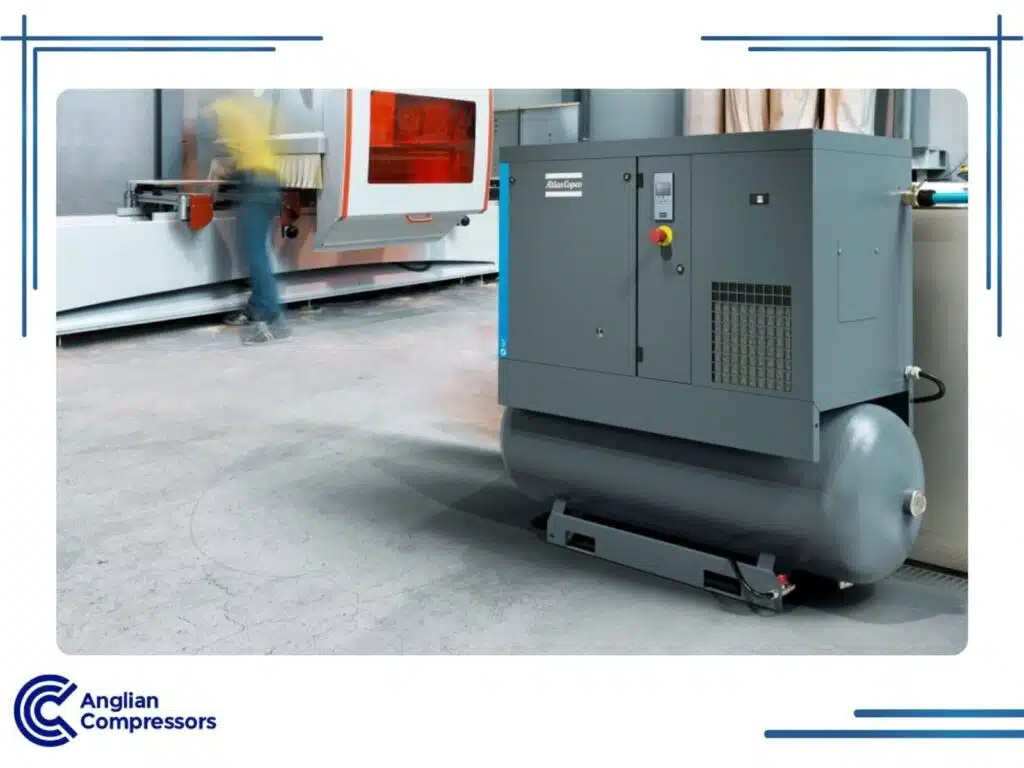Air Compressors for the Electronics Industry
When compressed air is so common in industrial settings, it’s hard to imagine it featuring in electronics manufacturing, where we envisage gleaming, high-tech facilities staffed by gowned and masked technicians, and robotic machines. But it’s the humble air compressor that makes it all possible. Behind even the most sophisticated electronics and semiconductor manufacturers, compressed air will play a key role.
There are three core reasons why compressed air is so important, and shared with other sectors.
First, compressed air is incredibly versatile. Depending on installation and user needs, it can fulfil a variety of functions. We have seen the same air compressor installed by two different clients, and both used in unique ways.
Second, compressed air is very efficient. Air compressors have a high energy conversion efficiency: there isn’t much energy lost to heat, noise, or vibration, but instead it’s transferred into the compressed air. And from that, directly into the task it fulfils.
Third, compressed air is incredibly cost-efficient. A combination of its versatility and efficiency. Your compressed air system can perform several tasks, minimising the systems you must maintain, and reducing the complexity of your processes.
Getting Oil-Free Compressed Air: Ensuring Purity in Electronics Manufacturing
Most industrial air compressors use oil for lubrication, improving efficiency and longevity. However, in electronics manufacturing, even trace oil contamination can cause defects. Oil-free air compressors eliminate this risk by operating without oil in the compression chamber, ensuring clean air for sensitive processes.
While rotary screw compressors and other types of industrial air compressors can achieve high air quality with filtration, only stringent ISO Class 0 oil-free air compressors for electronics guarantee absolute purity. These compressed air solutions are essential for consistent air supply, reducing downtime and energy costs while meeting the industry’s air demand.
Using air compressors in semiconductor and electronics production
The cleanliness standards in electronics manufacturing can be many times higher than in an operating theatre. Despite their sophistication, intricate semiconductors integrated circuits can be surprisingly delicate, and even a single mote of dust in the wrong place during production can result in the failure of electronic devices.
Compressed air plays a critical part in maintaining a cleanroom environment. From removing contaminants as part of an entry protocol, to serving as a contactless tool to move components, or even using the highly filtered pressurised air to regulate temperatures inside.
Customised compression for the electronics industry
We have seen air compressors deployed to power almost any task imaginable. Our design team can create a custom installation that meets your requirements.
Common uses of compressed air can be as straightforward as powering a conveyor and a picking and packing process after manufacture, something that even at that stage requires a delicate touch. However, we can also make an installation that helps you to automate more complex tasks. This might include automated parts of the production process, cleaning of electronic components used during manufacturing, and even testing.
It’s important to design systems for the use you need. You might want class 0 compressed air in a cleanroom, but can use a much lower standard to drive the conveyor belt in your final packing process. An Anglian Compressors’ custom design means you have a system that is perfect for your manufacturing process, and it means you never have to pay more for a higher specification of air than the task demands.
Generating Nitrogen On Site: A Smarter, Cost-Effective Solution
In electronics manufacturing, nitrogen is essential for preventing oxidation in soldering, maintaining clean environments, and protecting sensitive components. Instead of relying on bottled supplies, manufacturers can integrate on-site nitrogen generation with their air compressor system, ensuring a continuous, cost-effective, and energy-efficient supply.
Compressed air equipment extracts nitrogen from ambient air through pressure swing adsorption (PSA) or membrane filtration, delivering low-pressure, oil-free nitrogen at the required cubic feet per minute (CFM). This eliminates storage risks, reduces energy consumption, and ensures a consistent air supply without delivery delays.
Key applications include PCB manufacturing, reflow soldering, and component storage, where nitrogen ensures stronger solder joints and corrosion-free parts. With variable speed drive (VSD) compressors, manufacturers can further optimise air demand, minimising the cost of ownership while achieving precise nitrogen purity.
Switching to on-site generation is the right air compressor solution for businesses seeking reliability, efficiency, and long-term savings in a range of applications.

A crucial part of electronics manufacturing
Compressed air has been used in manufacturing and industry for over a hundred years — even longer if you include the bellows used in forges — and it might feel out of place in high-tech sectors like electronics.
However, it is becoming more, not less, essential as technology advances.
The need to ensure that semiconductors are manufactured without the slightest bit of contamination, or that printed circuit board solders are effective, or that components are placed accurately, and with the correct level of force, means that high-quality, calibrated equipment is essential. And compressed air can power all those uses and more.
But when your processes rely on this, you need to be able to rely on your air compressor.
Anglian Compressors has been installing and servicing air compressors for electronic manufacturing for decades. Our team can design and install a system using one of Atlas-Copco’s award-winning range of compressors that will meet your needs exactly. And if you already have a compressor, our engineers can service any model of air compressor.
Our service plans range from call-out options to full servicing and maintenance programmes. We audit and test equipment at every visit, so you can be sure that your compressor is working exactly as you need, and that the air or gas you rely on meets the standards you require, however demanding they might be.
Just get in touch with our team and find out how Anglian Compressors can help you with your compressed air needs, both now and in the future.
FAQ
Why are air compressors essential in electronics manufacturing?
Air compressors are critical in electronics manufacturing for a variety of tasks, including powering pick and place systems, maintaining cleanroom environments, and ensuring contamination-free handling of delicate components like PCBs.
Compressed air delivers precise, high-quality air, minimising the risk of damage to sensitive electronic products and components. Oil-free compressors eliminate the risk of contamination, which is essential in meeting Class 0 air quality standards required for many electronics applications.
What are the benefits of using oil-free compressors in cleanrooms?
Oil-free solutions are preferred in cleanrooms for electronics manufacturing because they eliminate the risk of oil contamination, ensuring that high-performance air compressors deliver pure air.
This is crucial when working with sensitive components like semiconductors, where even tiny contaminants can affect the final product. Manufacturers prefer compressed air systems that meet Class 0 air quality standards, ensuring the clean, dry air required for high-precision environments.
How do screw compressors support electronics manufacturing operations?
Screw compressors, particularly oil-free rotary models, are commonly used in electronics manufacturing for their ability to provide consistent, efficient, and high-quality compressed air.
They ensure that tasks requiring a range of compressed air needs, such as powering pneumatic tools and cooling products, are met with minimal energy loss. These compressors also help meet the strict cleanliness standards in electronics applications, contributing to the production of high-purity products.


